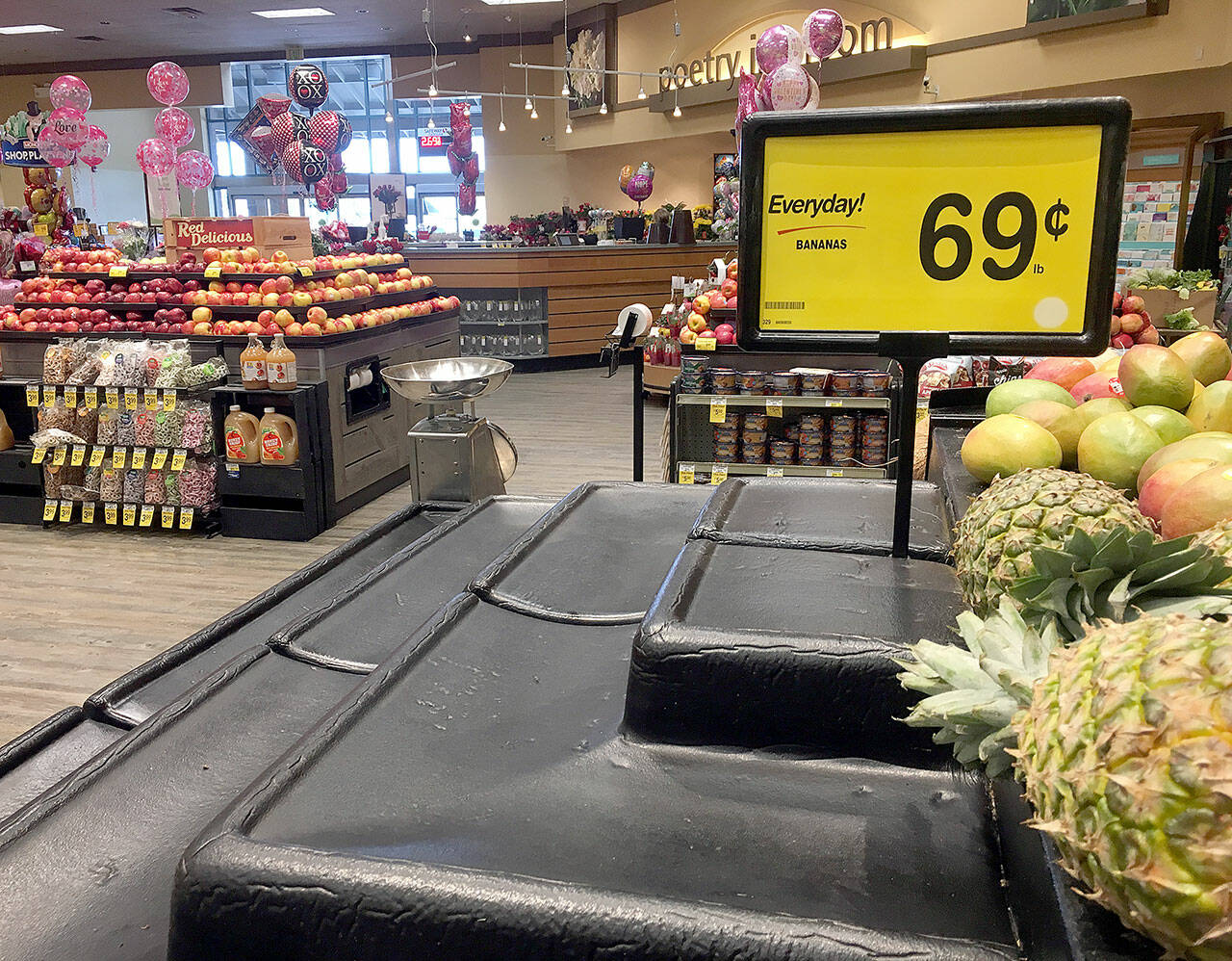By The Herald Editorial Board
Especially amid a contentious midterm election with control of Congress still to be determined, the dry details of a corporate merger might easily escape the attention of most. But one proposed merger should have the attention of anyone concerned for their local grocery store and the price of meat, bread, eggs, milk and more.
Kroger — which in Washington state owns and operates Fred Meyer and QFC stores — has proposed purchasing Albertsons — which owns and operates Safeway and Haggen stores in the state — for nearly $25 billion, creating a major player in the U.S. grocery market that would operate some 5,000 stores in 48 states, controlling about 13 percent of the U.S. market as it seeks to compete with Wal-Mart, Costco and Amazon, which owns Whole Foods.
The concern is that such a merger would likely result in the sales or closures of stores, the loss of jobs and even higher prices for consumers who could see fewer options for shopping and in some communities growing “food deserts.”
Typically, such mergers can take years, further muting the immediate concern for shoppers; except that Albertsons and the private equity firms that own about 75 percent of the company had planned as soon as Nov. 7 to pay out $4 billion to shareholders in advance of the sale to Kroger.
However, that payout to shareholders was put on hold last week after a King County judge sided with Washington state Attorney General Bob Ferguson, whose office sought a restraining order and filed suit to block the payout out of concern that draining $4 billion from Albertsons’ assets could undercut the grocery chain’s ability to compete — and to even keep stores open — during the lengthy federal antitrust review of the merger. Attorneys general in five other states also have sued to stop the payout while the merger seeks approval.
Beyond a dividend bump to shareholders, the $4 billion payout may be an attempt to weaken Albertsons enough to make the merger more likely, the lawsuit contends:
“Discovery may reveal that the ‘Special Dividend’ reflects a calculated effort to leave Albertsons just battered enough for Defendants to argue later (to regulators or a court) that it is a ‘flailing’ or ‘failing’ firm that Kroger should be allowed to acquire lest it go out of business anyway, but still worth its hard assets and Kroger’s gain from neutralizing a competitor.”
While the judge approved the restraining order, it’s in effect only until today when a hearing is scheduled to consider a longer-term preliminary injunction; approval of such an injunction is not guaranteed.
The loss of grocery stores for some neighborhoods isn’t theoretical. It’s common as part of antitrust approval for federal regulators to require the sale of stores where once-competing stores are more closely located. And if sales aren’t required, the closure of overlapping supermarkets is a possibility as the larger company seeks to trim costs and pay dividends to shareholders.
Consider that in Snohomish County, Albertsons operates about 15 Safeway stores within or near county borders as well as three Haggen locations in Lake Stevens, Snohomish and Marysville, while Kroger operates eight Fred Meyer stores and seven QFCs. In Everett alone, two Safeway locations — at 41st and Rucker, and 17th Street and Broadway — are within blocks of two QFCs, at 50th St. SE and Evergreen Way, and Broadway and Everett Avenue.
Closure of one or more of those stores could mean lost jobs for employees and longer trips and less competitive pricing for shoppers. And sales of stores to third parties offer no guarantee that the new owner has the capital necessary to allow a store to offer competitive prices, pay fair wages to employees or even remain in business.
Albertsons, the Attorney General’s lawsuit claims, has been here before, in 2014, when it purchased the Safeway chain and was ordered by the Federal Trade Commission to part with 26 stores in the state and another 120 elsewhere in the Western U.S., selling them to Haggen, which at the time was a small local chain of only 18 stores. Haggen, overwhelmed, filed for bankruptcy and sued Albertsons over the sale. In the end Albertsons bought back 14 of the stores in this state, only three of which continue to operate as supermarkets. Albertsons then reacquired Haggen’s remaining 15 stores, which it now seeks to sell to Kroger.
Clean up needed on Aisle 1!
Two U.S. senators — Bernie Sanders, I-Vt., and Elizabeth Warren, D-Mass. — have called on the FTC and the Biden administration to reject the merger. “Big grocery chains like Kroger and Albertsons are already gouging families with inflated prices. More mergers and less competition would mean even higher prices — and layoffs for employees,” Warren tweeted.
In the more immediate term, Albertsons — specifically its private-equity owners — should be blocked from paying themselves and weakening Albertsons’ stores, speeding their failure and easing the way for a merger that offers even greater opportunities for investors to shoplift from their own stores’ aisles.
Talk to us
> Give us your news tips.
> Send us a letter to the editor.
> More Herald contact information.

























